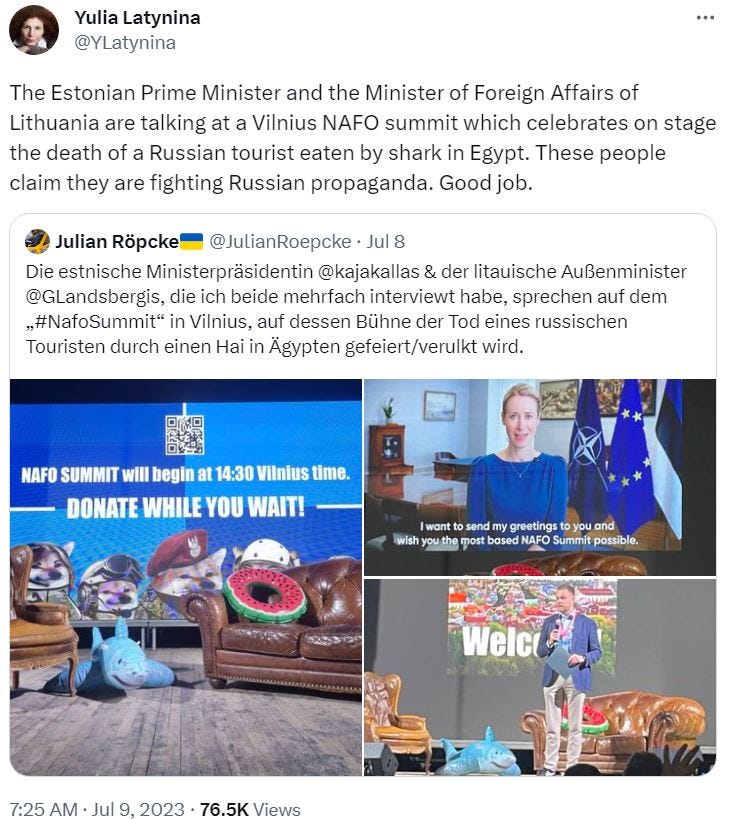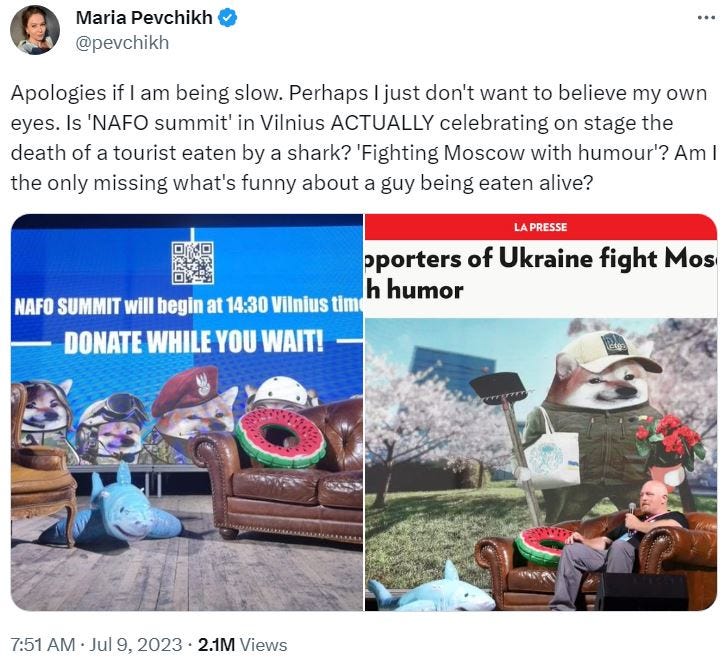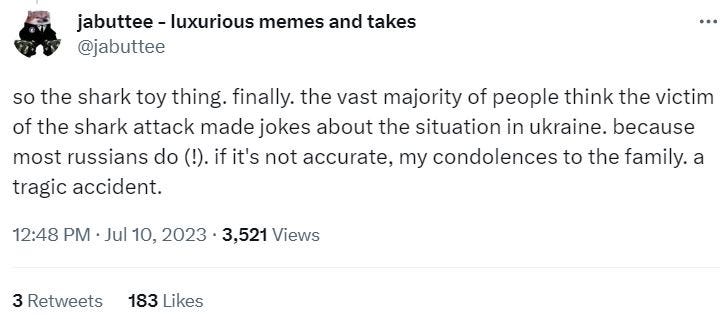
Pro-Ukraine Activists Still Clashing with the Russian Opposition
This time, a fight over a meme distracts from the larger things they share in common.

WHILE THE NATO SUMMIT in Vilnius focused on questions of Ukraine’s future membership in the alliance and of current aid to its war effort against the Russian invasion—genuinely existential issues for Ukraine and for the future of freedom in Russia—the related shadow “summit” of the online activist group that calls itself NAFO, or the North Atlantic Fella Organization, sparked the latest round of verbal wars between pro-Ukraine militants and the liberal Russian opposition.
NAFO, identifiable by its trademark image of a cartoon-like Shiba Inu dog somewhat similar to the Dogecoin logo, was founded in May 2022 to counter Russian propaganda online with trolling, trash talk, and memes as well as serious debunkings. In that capacity, it has won praise from some prominent Ukrainians and friends of Ukraine, including Ukraine’s minister of defense, Oleksiy Reznikov, and the British defense secretary, Ben Wallace. Recently, however, NAFO alienated some supporters with memes that made fun of a fatal shark attack on a Russian national in Egypt, suggesting that the young Russian man’s death was karma of sorts and that the shark deserved an award from Ukrainian military leadership. The NAFO gathering in Vilnius—an event sufficiently high-profile to feature greetings from Lithuanian Foreign Minister Gabrielius Landsbergis and (by video) Estonian Prime Minister Kaja Kallas—gave these memes a new life with an inflatable shark prominently displayed onstage.
Some Russian critics of the war and of Vladimir Putin’s regime were not amused, among them Yulia Latynina, a prominent expatriate journalist, and Maria Pevchikh, the head of Alexei Navalny’s Anti-Corruption Foundation.
The response was a torrent of personal and political abuse against Latynina, Pevchikh, and the Navalny team, who were accused of caring more about NAFO’s inflatable shark than about Russian war crimes in Ukraine and Ukrainian war victims. (That charge is ridiculous: Both Latynina and the Navalny team’s YouTube channel, Popular Politics, have devoted countless hours to the war, including Russian war crimes and the suffering of Ukrainians.) NAFO posters and others also accused Latynina and the Navalny team of being Kremlin stooges, “just another flavor of imperial garbage,” and servants of Russian propaganda hiding behind the masks of “good Russians.” Some people tried to defend the shark memes by claiming that the Russian man fatally mauled by the shark, 23-year-old Vladimir Popov, had earlier made a video mocking Ukrainian victims of the Kakhovka dam explosion. When Pevchikh and others pointed out that this claim had been debunked (the video was real but made by an entirely different Russian man), the replies amounted to “I believed it because so many Russians do act this way.”
Meanwhile, a tweet by Navalny associate Diana Rudakova about a replica of the punishment cell in which Navalny has been held almost continually for six months was flooded with comments attacking Navalny as a “Kremlin asset” or mocking his imprisonment.
ONE CAN DEBATE WHETHER the Russian liberal opposition plays any meaningful role in the current situation when civil society in Russia is basically destroyed and the real action takes place in Ukraine’s battlefields—and in Western political spaces where decisions are made about helping Ukraine with weapons. Still, the contributions of Russian dissidents should not be discounted. In some cases, they have helped Ukrainians deported to Russia get out. Dozhd (TV-RAIN), the exiled TV channel sometimes faulted for supposedly being too pro-Russian, has helped find kidnapped Ukrainian children stashed away in Russian boarding schools. Independent Russian media have provided information that helps young men avoid being conscripted and sent to Ukraine—which helps not only those men but Ukraine as well, by reducing Russian manpower on the frontlines. And, of course, those media, including the Popular Politics YouTube channel, also provide a vital source of information for Russians who oppose or question the war. The Navalny team has also helped track down sanction-evading Putin cronies and accomplices still enjoying a good life in the West. (When someone pointed out such an exposé during the NAFO controversy, the NAFO response was characteristically hostile: “Their entire schtick is look over there at the bad russians, we’re good russians, don’t look at Ukraine. . . . I just don’t want any Fellas to have the mistaken impression that this Navalny crew are anything other than complete frauds who are actively damaging the Ukrainian cause.”)
In the wake of the NAFO shark controversy, some Ukraine supporters had words of high praise for Garry Kasparov’s remarks at the NATO public forum in Vilnius. Kasparov argued that “the liberation of Russia from Putin’s fascism” was possible only after a full Ukrainian victory in the war and that “Ukrainian victory includes three things: liberation, reparation, and justice”—and also insisted that “every Russian, myself included” shares “collective responsibility for the crimes committed in Ukraine.” He was also explicitly critical of “the majority of the Russian political opposition” for evading such moral clarity. Kasparov specifically mentioned “the debate about the shark,” expressing the view that “we have no moral right to criticize Ukrainians whatever they do.”
Yet on the first two points—Ukrainian victory as key to the downfall of the Putin regime, and not only the full liberation of Ukrainian territory but reparations and justice as a part of that victory—most of the Russian liberal opposition likely agrees. That includes Latynina, who was among the signatories (along with Kasparov) of the “Declaration of Russian Democratic Forces” which includes those points. It also includes Navalny, who endorsed similar points in a statement published in February.
And as for “collective responsibility,” it’s an extremely complex issue. If it means that it’s morally appropriate for Russians who did not support the war to pay the price for it in sanctions or postwar reparations, many Russian liberals agree. But if it means that every Russian national living in Russia or abroad can be regarded as morally complicit in the war, one may legitimately ask just how far such an assignment of complicity goes: to the point where a random Russian’s horrific death can be treated as fair game for celebration?
It is also worth noting that, for the most part, NAFO posters are not Ukrainians or war victims. They are strong Ukraine supporters, and rightly so; but if they carry their zeal to the point of blanket hatred of all Russians, this is not a good sentiment. (Most of the Twitter users slamming Navalny as a Kremlin stooge are probably comfortable residents of Western countries mocking and attacking a political prisoner—which rather alters the moral calculus.) It’s worth noting that while Ukrainian public figures have often been understandably wary of the liberal Russian opposition, they have also been careful not to demonize it or shun it, as evidenced by many Ukrainian officials’, activists’, and pundits’ appearances as guests in Russian expatriate media.
Some Russian liberals have been arrogant and tone-deaf. Some of their critics have crossed the line into bad faith and lack of basic decency. Of course bad NAFO jokes about the Russian eaten by the shark are not the biggest problem right now. But Russian opposition activists who rightly find such jokes repugnant are not Ukraine’s enemy.


















